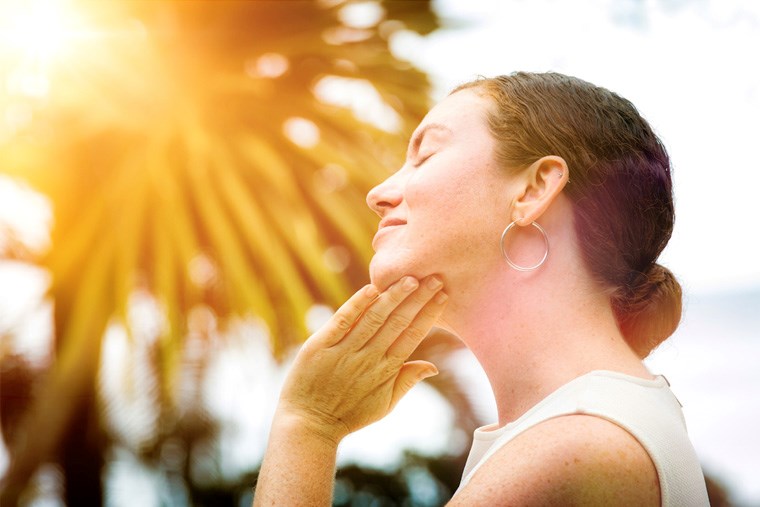As we head outside to take advantage of the warmer weather, skincare and sun safety should be top priorities. While the sun’s rays provide countless benefits, the ultraviolet (or UV) components of sunlight are damaging to our skin. A sunburn from overexposure isn’t just temporarily painful - the UV rays that cause a burn are doing long-term damage to your skin cells that’s irreversible. Sun-safe skincare is all about prevention! It’s crucial that you know how to protect your skin while enjoying time outside, so here are the most important facts about SPF and sunscreen – read up, choose the right products for you, and then go soak up that sun!
What is SPF?
When you see SPF on a label, it stands for “sun protection factor” and indicates that a certain percentage of harmful rays will be blocked for a certain period of time. The number (10, 20, 50, etc.) tells you how many times longer it would take you to burn than if you weren’t wearing sunscreen. For example, without sunscreen, you might burn in 15 minutes; with SPF 10, you could stay in the sun 10 times longer without burning (150 minutes, or 2.5 hours). The values were determined in laboratory tests using lights that mimic the strength of the typical midday sun, so if you live in a high elevation area, be aware that you will burn faster than others and might need a higher SPF value to last a couple of hours. Depending on your skin tone and colouring, your coverage time with various SPF values will vary.
Is a Higher SPF Better?
Interestingly, a higher SPF is not necessarily “better.” A higher SPF value means that a higher percentage of harmful rays are being blocked, increasing your time in the sun without burning. While SPF 50 will protect you longer than SPF 2, they’ll technically protect your skin equally as well. The advantage to using a higher SPF is that you don’t need to remember to reapply as often. If you burn easily or have other skin conditions, your doctor or dermatologist may recommend a high SPF to help minimize the risk if you forget to reapply as frequently as you should. Regardless of SPF value, experts recommend that you reapply at least every two hours and after swimming or sweating.
 NicolasMcComber via gettyimages.com
NicolasMcComber via gettyimages.comUVA vs. UVB
Originally, sunscreen was designed to protect against the “B” variety of UV rays which are shorter and lead to visible sunburn. Over the years, however, scientists have determined that UVA rays (which are longer and don’t leave burns) are equally damaging - UVA exposure can lead to premature aging of your skin and increase your risk for developing skin cancers. It’s essential to wear sunscreen that protects against both UVA and UVB rays.
Which Product Should I Buy?
Universally, the best products are ones that have “broad spectrum” or “full-spectrum” coverage with an SPF of at least 15. With broad-spectrum coverage, you’re getting protection against both UVA and UVB rays, and the SPF 15 will give you protection for the recommended 2 hours before reapplying. Beyond that, choosing the right sunscreen will depend on your plans for the day and your skincare routine. For a daily moisturizer with SPF, this Neutrogena Daily Defense Lotion provides excellent coverage and is light enough to wear under makeup. For days when you’re very active in the pool or sweating, this Pacifica Bronzing Body Butter is water-resistant up to 80 minutes and masks the typical sunscreen smell (and is vegan and cruelty-free!). Ultimately, the best product is the one that you’ll actually use on a daily basis.
Other Sun Safety Tips
Even when wearing sunscreen, there are several other precautions to take for sun safety and skin health. First, try to stay in the shade between 10:00 am and 2:00 pm as much as possible since the sun’s rays are strongest around midday. In addition, make sure to wear appropriate clothing whenever you’re in the sun - while the skin on your arms and legs isn’t as sensitive as that on your face, continued sun exposure can often lead to premature aging in those areas. Finally, make sure to wear sunscreen on areas that have the greatest sun exposure, even if you’re covered up! Your face, shoulders, and neck always need sunscreen since UV rays can penetrate some clothing.
Armed with this sun-safe skincare knowledge, you’ll be able to enjoy your days in the sun all season long!
 This story was made possible by our Community Partners Program. Thank you Didsbury Dental for helping to expand local news coverage in Alberta. Learn more.
This story was made possible by our Community Partners Program. Thank you Didsbury Dental for helping to expand local news coverage in Alberta. Learn more.


